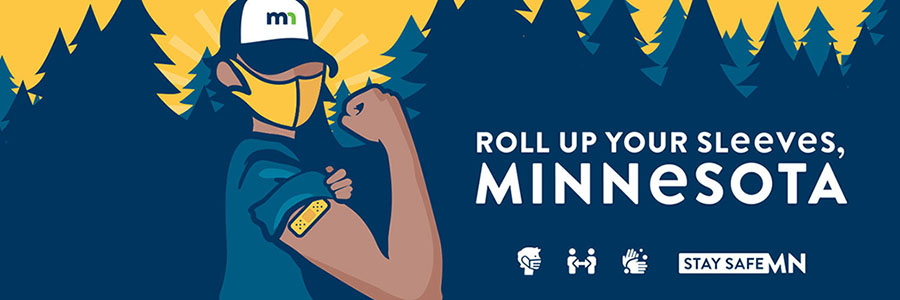The MDA has created and compiled information related to the coronavirus (COVID-19) pandemic and food and agriculture. This page will be updated as information changes.
Do you have general questions about food and agriculture in Minnesota during the COVID-19 pandemic? Email the MDA at: mdaresponds@state.mn.us

COVID-19 Vaccination Information
- Vaccine Employer Toolkit - This toolkit is designed to direct employers to the resources they need to help their workforce get vaccinated safely and efficiently and to provide materials to educate employees about COVID-19 vaccines.
- Presentation to Employers - New Rollout
- Food Processors Vaccine Rollout Discussion (Recording)
All Minnesotans will have access to a safe, FDA-authorized vaccine for protection against COVID-19. Find your vaccine and learn who can get the vaccine.
The Vaccine Data Dashboard provides daily updated information on vaccine distribution.
General Information
Minnesota worker protections related to COVID-19, including sick leave, FMLA, discrimination, reporting health concerns at work, unemployment insurance, and workers' compensation.
Food and Beverage
The Centers for Disease Control and Prevention (CDC) report there is no evidence to suggest that COVID-19 can be transmitted through food grown in the United States or imported from other countries. However, food safety is important at all times and the MDA helps to ensure that food is produced and sold in a safe manner.
- FDA: Temporary Flexibility Policy Regarding Certain Labeling Requirements for Foods for Humans During COVID-19 Pandemic
- Guidelines for Small Minnesota Meat Processing Plants - English | Hmong | Somali | Spanish
- WEBINAR: Dairy Plant COVID-19 Preparedness
- WEBINAR: The ABCs of Small Meat Processing Options in Minnesota, or view the presentation slides (PDF).
- MAP: Minnesota Meat Processors
- Farm Winery Alcohol Sales - Minnesota Department of Public Safety: On Sale Liquor Licenses and On Premises Consumption
Farmers and Ranchers
The COVID-19 pandemic may be adding to farmers’ financial problems, price and marketing uncertainties, marital difficulties, and social pressures. You can:
- Contact the Minnesota Farm and Rural Helpline anytime (call 833-600-2670 or text FARMSTRESS to 898211).
- Visit the Minnesota Farm and Rural Helpline website for information and resources.
- Reach out to a of Minnesota Farm Advocate who can offer one-on-one help for many kinds of crises (e.g., operating loan problems, mediation, foreclosure, natural disasters).
The Minnesota Rural Finance Authority (RFA) also helps farmers whose operations are affected by COVID-19. New rules mean farmers can access the Disaster Recovery Loan Program if they they experience loss of revenue due to human contagious disease. Visit the RFA Disaster Loan Recovery Program website or contact 651-201-6004.
Other Resources:
- USDA’s Coronavirus and USDA Assistance for Farmers page that provides easy-to-find information about federal help available to farmers.
- University of Minnesota Extension’s Ag Business Management Team offers information as well as help navigating financial assistance programs (including loan and direct payment programs).
- Farmers Legal Action Group, Inc. (FLAG) has published a A Farmers’ Guide to COVID-19 Relief.

